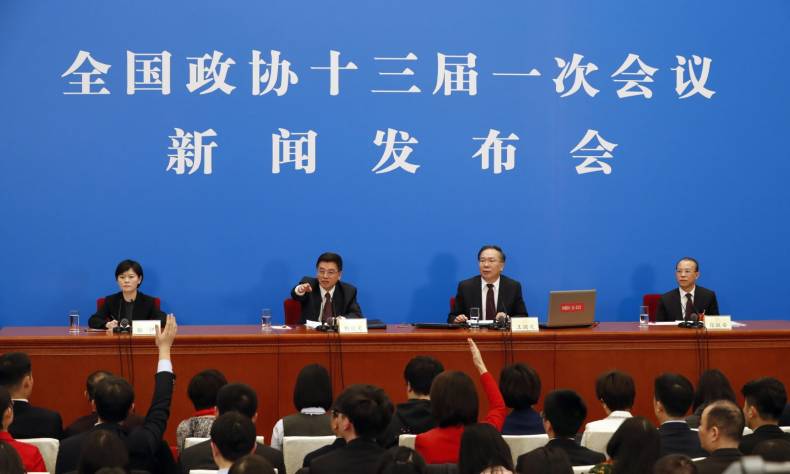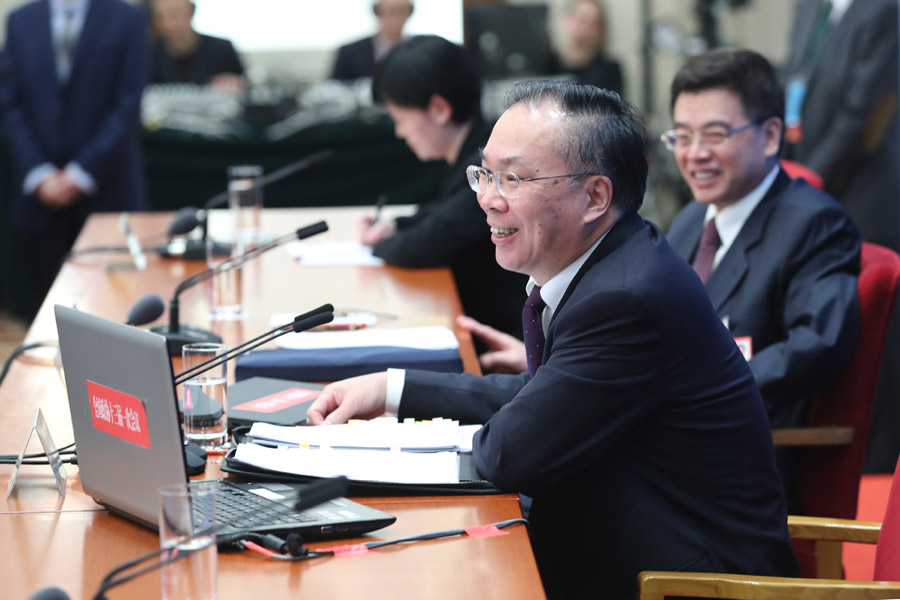
Press Conference of the 1st Session of the 13th CPPCC National Committee
On the press conference of the first session of the 13th CPPCC National Committee on Friday, the spokesperson, Wang Guoqing, responded to the hot issues in the fields of politics, economy, diplomacy…
The news conference of the first session of the 13th CPPCC National Committee was held in Beijing on Friday.
Wang Guoqing, the spokesperson for the first session of the 13th National Committee of the CPPCC hosted the news conference, responding to the hot issues in the fields of politics, economy, diplomacy…

Focus is on Quality Economic Growth
The national political advisers believe that sound and stable economic growth will continue in 2018, supported by supply-side structural reform, Wang Guoqing said at the news conference.
Other major tasks to ensure the growth model transformation include developing the real economy, preventing systemic risks and improving people’s livelihood, he said.
In 2017, China showed an “encouraging” annual economic report, with total GDP of more than 82 trillion yuan ($12.9 trillion), equal to the combined GDPs of the world’s fifth to tenth largest economies, Wang said.
The year-on-year economic growth rate of 6.9 percent last year also was remarkable among the world’s major economies, he added.
Favorable Atmosphere Needed for China-Japan High-level Exchanges
The reason why Sino-Japanese relations are sometimes good and sometimes bad is repeated relapse of the Japanese government’s attitude on historical issues as well as the “narrow perspective of some Japanese politicians who consider China as a strategic rival,” Wang said.
“A country that tries to forget its past and fails to face up to history will not earn respect,” he said.
He suggested that the two countries take history as a mirror and face towards the future.
“As long as the wellbeing of Japanese and Chinese people is taken to heart, bilateral relations will be able to break this odd pattern of ups and downs,” he said.
“Sharp Power” A New Version of “China Threat” Rhetoric
Accusing China of showing “sharp power” by some western people is full of hype and bias, and is a new version of the “China threat” theory in nature, the spokesperson said.
Pursuing double standards and cold war thinking, they say western countries demonstrate their “soft power” or “smart power,” while claiming the same demonstration from China is “sharp power,” Wang Guoqing told the press conference.
“The international community, especially major countries, should boost cultural exchanges characterized by harmony within diversity and inclusiveness, forge a new form of international relations featuring win-win cooperation, and work together to build a community with a shared future for humanity,” he said.

China, U.S. Should Protect Authority of WTO Rules
China and the United States should both work to protect the authority of World Trade Organization (WTO) rules, Wang said.
As important WTO members, the two countries should work together to improve the multilateral trade system with the WTO at the core, he said.
Wang made the remarks when commenting on reports that the U.S. side said recently it was a mistake to support China’s WTO accession as the move had failed to make China’s economy more open.
Wang refuted the accusation, citing China’s efforts over the years to reduce tariff, open up market, oppose protectionism, protect intellectual property rights and promote equal competition.
China will continue to open up on all fronts, substantially lower market threshold, further open its service sector, and create a sound investment environment, he said.
“A more open China market will make bigger contributions to global development,” Wang added.
SOEs to Undergo Further Reform
State-owned enterprises will become more strategically well-positioned through various mergers and reshuffles, with State-owned capital allocation efficiency further boosted and development quality substantially enhanced, said Wang.
The SOE reform is in accordance with legal norms and market discipline, he said.
After restructuring, companies see their total assets up 59 percent compared with five years ago and profits up 42 percent, statistics show, and China already sees a batch of world-class companies coming on the horizon, he added.
HK, Macao Urged to Actively Join Bay Area Development
Wang Guoqing said Hong Kong should take full advantage of the great opportunities to further consolidate and promote its international status in finance, shipping, trade and aviation.
The city should also strengthen its position as a global hub for cross-border renminbi business, international asset management and risk management, he said.
Besides, Hong Kong needs to fully promote its innovation and technology industry and nurture emerging industries, Wang said. He also called on the city to build an international law and dispute resolution service center in the Asia-Pacific region to promote itself into an international metropolis with greater competitiveness, he added.
Meanwhile, Wang also urged the Macao SAR to also make full use of the opportunities provided by the Bay Area, concentrating on upgrading itself to a global tourism and recreation center, as well as a key platform for business cooperation between China and Portuguese-speaking countries.
In addition, the Macao SAR government should also make efforts to moderately diversify its own economy, and build itself as a base for global cultural cooperation and exchange, Wang said.
Gang Crimes Prosecuted by Law
Gang-related crime is a cancer of the society and a disease that people hate. The nationwide campaign was introduced to deal with the new trends in gang-related crimes. It was a major decision by the central leadership, Wang said.
The large-scale campaign will win over people’s hearts and be a victory for the rule of law, he said.
Source: Xinhua, China Daily
Eiditor: Cai Hairuo
 Facebook
Facebook
 Twitter
Twitter
 Linkedin
Linkedin
 Google +
Google +










